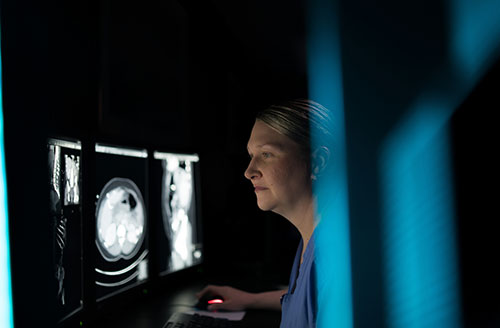 The Abdominal Imaging Division of Penn Radiology has a long legacy of innovation and clinical excellence. From early innovation in fluoroscopy, to the first endorectal coil for human prostate MRI, Penn Radiology has been at the forefront of numerous technological and clinical advancements.
The Abdominal Imaging Division of Penn Radiology has a long legacy of innovation and clinical excellence. From early innovation in fluoroscopy, to the first endorectal coil for human prostate MRI, Penn Radiology has been at the forefront of numerous technological and clinical advancements.
The overarching goal of the Abdominal Imaging Division is threefold:
- Provide clinical excellence throughout the range of imaging services across all modalities and disease sites
- Create the next generation of expert abdominal imagers through resident and fellowship training programs
- Promote scientific and scholarly advancements in all aspects of abdominal imaging, including information technology and artificial intelligence.
Clinical
Among the largest of the clinical divisions in Radiology at Penn, the Abdominal Imaging Division encompasses all aspects of plain film, fluoroscopic, US, CT, and MR imaging of the abdomen and pelvis, in addition to providing leadership and cutting-edge clinical services in vascular and head-and-neck US.
The clinical program includes separate operational areas in US, CT. MRI and plain film/fluoroscopy, serving the Hospital of the University of Pennsylvania, the Perelman Center for Advanced Medicine, the Penn Presbyterian Medical Center, and a variety of out-patient imaging centers in the greater Philadelphia region.
In additional to all routine aspects of cross sectional abdominal and pelvic imaging, specialty clinical services that faculty and trainees participate in regularly include thyroid nodule clinic, CT screening colonography, CT- and MR-enterography, multi-parametric prostate MRI with US-MR image-guided fusion biopsy, dual-energy CT applications, contrast enhanced US evaluations, and advanced multiparametric liver MRI evaluations.
Explore our clinical service offerings and meet our clinical team
Education and Training
The Abdominal Imaging Division prides itself on its ability to educate and inspire health care professionals at all levels of training. We offer a comprehensive residency program, which emphasizes technical and diagnostic skills and mentoring.
Residents and fellows on rotation are given detailed instruction on technical and clinical issues encountered in daily practice. They are given the responsibility to determine the protocol and preview patient studies, which they review and discuss with the attending radiologists. They also participate in the planning and performance of procedures and biopsies performed by the various sections under the supervision of faculty members.
Inpatient, emergency room, and outpatient services supply an amazing wealth of clinical material on a daily basis, which prepares the trainees to handle with confidence diverse and complicated cases. Teaching is at the heart of the clinical activities on a daily basis, even on busy days, as well as in the form of conferences sponsored by the section. Furthermore, the trainees are encouraged to participate in clinical research projects of interest to their section. The close clinical and research interactions make for a rich learning environment .
Research
We also include among our membership imaging scientists in the Radiology Department, with basic and translational programs in a wide range of applications. The Abdominal Imaging QA program, led by Dr. Hanna Zafar, has led the field in the application of data-centric methods for the management of actionable and incidental findings in abdominal imaging.
The division currently regularly collaborates with the following radiological labs and centers at Penn Medicine: